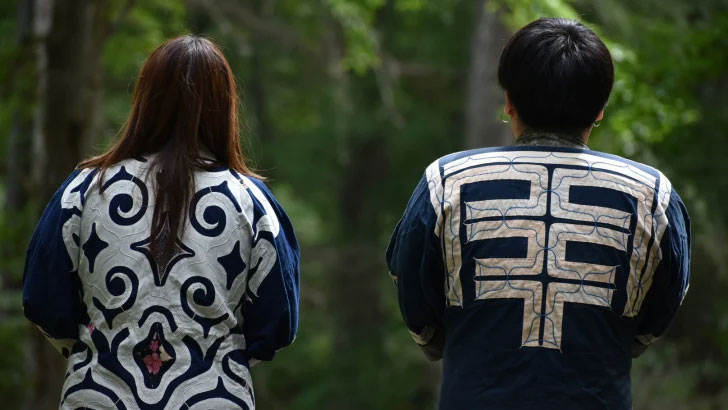
Ankes (Harada Rino and Shinmachi Seiya))
TALK AND DEMONSTRATION Ainu Stories by Ankes
- 2 October 2023
- 18:30-19:30 BST
- The Hall, Japan House London, 101-111 Kensington High Street, London, W8 5SA
- https://www.japanhouselondon.uk/whats-on/2023/ainu-stories-by-ankes/
- +44 (0)20 7932 7100
- info@japanhouselondon.uk
- Tweet
In advance of the exhibition Ainu Stories: Contemporary Lives by the Saru River opening this November, Japan House London invites the singing duo Ankes to introduce their heritage and background, accompanied by a performance of Ainu songs.
Ankes (meaning ‘twilight’ in Ainu) was formed by Harada Rino and Shinmachi Seiya in Nibutani, a district in the town of Biratori, Hokkaidō, in northern Japan. In this event, held in conversation with Japan House London Programming Director Simon Wright, the young performers explore their Ainu roots, discussing their identity, cultural background and life in Biratori. The event also includes an a cappella performance by Ankes of upopo (celebratory group songs sung in ceremonies and daily life) and an opportunity for guests to ask questions to the speakers.
Booking Essential | Admission Free
Ankes
Ankes is a duo unit founded by Harada Rino and Shinmachi Seiya. Despite living in different places, they have known each other since their childhood and met again at the Urespa Club promoting Ainu culture in Sapporo University, Hokkaidō. After graduation, they started to work in Nibutani, in the town of Biratori and formed the musical duo Ankes, which means ‘twilight’ in the Ainu language. They mainly focus on oral literature and Upopo songs, which are passed down from generation to generation in their home area along the Saru River, and they are also exploring various regional music, drawing from their background experience from the Urespa Club.
Shinmachi Seiya
Shinmachi Seiya was born in Tomakomai, Hokkaidō in 1998. At the age of 17, he learned that he was of Ainu descent. Despite losing sight of his identity, he enrolled in Sapporo University and felt that he could establish his own self during his time there. Although he usually prefers to be out of the spotlight, he is happy to be seen performing Upopo songs.
Harada Rino
Harada Rino was born in Nibutani in Biratori, Hokkaidō in 1997, where she grew up surrounded by Ainu culture from an early age. She studied Ainu language and culture in Sapporo University in Urespa Club, a university organization where she became fascinated by and immersed in dances and Upopo songs. After graduation, she returned to her home village. While working for the administration of a project which fosters future leaders in the promotion of Ainu culture, she has been working to pass on the current Ainu culture through old dances and Upopo songs.
